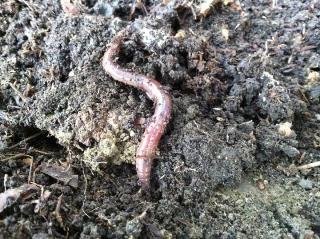May 22 2015
Invasive earthworms in New England's forests are absorbing toxic metal pollutants in potentially hazardous levels that may be contributing to a decline in birds, amphibians and mammals that feed on them, a Dartmouth-led study finds.
 European and Asian earthworms invading New England forests are passing on metal pollutants in potentially hazardous levels to predators that feed on them, a Dartmouth College-led study finds. Credit: Justin Richardson
European and Asian earthworms invading New England forests are passing on metal pollutants in potentially hazardous levels to predators that feed on them, a Dartmouth College-led study finds. Credit: Justin Richardson
The study, which suggests similar situations may be occurring in forests across the northeastern United States, appears in the journal Soil Biology and Biochemistry. A PDF is available on request.
Earthworms contribute to soil health in farm fields and gardens through their digging, fertile excrement and other ways, but they can also damage the chemical composition of forest ecosystems. They are considered invasive in New England, where the forests developed without them since the last ice age 11,000 years ago forced the region's original earthworms to move southward. In recent years, humans have been introducing exotic earthworm species from Europe and Asia through fishing, timber harvesting, municipal green waste management and gardening. The invaders' unchecked proliferation has forest and soil scientists worried about their future impact on forest ecosystems.
Dartmouth College and University of Vermont researchers analyzed nine forested sites in Vermont and New Hampshire and found that European and Asian earthworms are widespread. Forest soils typically store large amounts of pollutant metals from human activities, particularly the burning of coal and lead gasoline, but the researchers found that New England's non-native earthworms are bioaccumulating those metals, especially lead and mercury, to levels that are potentially toxic to predators. The findings suggest that invasive earthworms have a larger role than currently thought in the amount and fluctuation of pollutant metals in forests of the northeastern United States.
"Our results suggest that exotic earthworms could be responsible for the high levels of toxic metals in ground foraging animals such as birds, amphibians and even mammals across New England," says lead author Justin Richardson (https://earthsciences.dartmouth.edu/people/justin-richardson), who recently received his Ph.D. from Dartmouth's Department of Earth Sciences. "Our research highlights two important messages: Earthworms are not native in the forests of New England and they may negatively impact what forest soils do well: retaining pollutant trace metals from food webs."
Source: http://www.dartmouth.edu